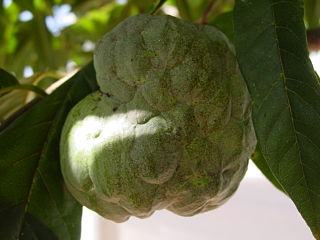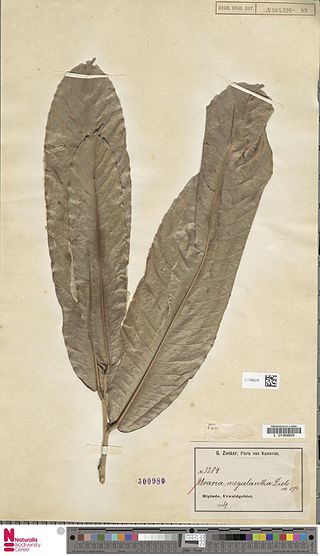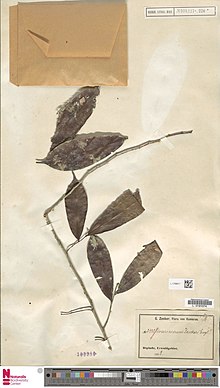
The Annonaceae are a family of flowering plants consisting of trees, shrubs, or rarely lianas commonly known as the custard apple family or soursop family. With 108 accepted genera and about 2400 known species, it is the largest family in the Magnoliales. Several genera produce edible fruit, most notably Annona, Anonidium, Asimina, Rollinia, and Uvaria. Its type genus is Annona. The family is concentrated in the tropics, with few species found in temperate regions. About 900 species are Neotropical, 450 are Afrotropical, and the remaining are Indomalayan.

Annickia is a genus of plant in family Annonaceae. Every species of this genus is native to continental Africa, from west Tropical Africa to Tanzania.

Anonidium is a genus of plants in family Annonaceae.
Isolona is a genus of flowering plants in the family Annonaceae. There are 21 species native to Africa. They occur in humid habitat types.

Monodora is a genus of plant in family Annonaceae. It contains approximately 15 species, distributed throughout tropical Africa.
Neostenanthera is a genus of flowering plant in the Annonaceae family. All discovered species are native to continental Africa. It contains the following species, according to The Plant List:

Uvariastrum zenkeri is a species of plant in the Annonaceae family. It is found in Cameroon and Nigeria. It is threatened by habitat loss.

Uvariodendron is a genus of plants in the family Annonaceae. It contains the following species :

Uvariopsis is a genus of flowering plants in the family Annonaceae. The genus is unique to Africa, and consists of about 18 species, all of which are either ramiflorous, cauliflorous or both.

Xylopia is a genus of flowering plants in the family Annonaceae. They are mostly trees and some shrubs. There are about 160 species distributed in Asia, Africa, and the Americas.

Artabotrys is a genus of plants in the Annonaceae family. There are over 100 species in the Old World tropics, with 31 species in Africa. It is part of the custard apple family (Annonaceae). All species are small trees or shrubs with a tendency to climb. Leaves are simple and alternate, without hairs. Bisexual flowers are borne singly or in clusters opposite the leaves. The 6-petalled flowers are scented, and the plant bears fleshy fruits.

Duguetia is a genus of trees and shrubs in the plant family Annonaceae with approximately 90 species in central and South America, and four species in west Africa.

Cremastosperma is a genus of flowering plants in the family Annonaceae, subfamily Malmeoideae, tribe Malmeae. In 2018 there were 34 recognised species distributed in Central and South America.

The Malmeoideae are a subfamily of trees and other plants of the family Annonaceae.

Annonoideae is a subfamily of plants in the family Annonaceae, with genera distributed in tropical areas world-wide. The family and this subfamily are based on the type genus Annona.
Cleistopholis is a genus of flowering plants belonging to the family Annonaceae.

Uvariastrum hexaloboides is a species of plant in the Annonaceae family. It is native to Tanzania, Zambia and Zaire. Robert Elias Fries, the botanist who first formally described the species using the basionym Uvaria hexaloboides, named it after a different species Hexalobus monopetalus which he thought its flowers and vegetative parts resembled.

Uvariastrum insculptum is a species of plant in the Annonaceae. It is native to Cameroon, Gabon, Ghana, Ivory Coast, Liberia, Nigeria, and the Republic of the Congo. Adolf Engler and Ludwig Diels, the botanists who first formally described the species using the basionym Uvaria insculpta, named it after the secondary veins on its leaves which are distinctly sunken.

Uvariastrum pierreanum is a species of plant in the Annonaceae family. It is native to Cameroon, the Central African Republic, the Democratic Republic of the Congo, Equatorial Guinea, Gabon, Ghana, Guinea, the Ivory Coast, Liberia, Nigeria, Sierra Leone and the Republic of the Congo. Adolf Engler, the botanist who first formally described the species, named it after the French botanist Jean Baptiste Louis Pierre.
















